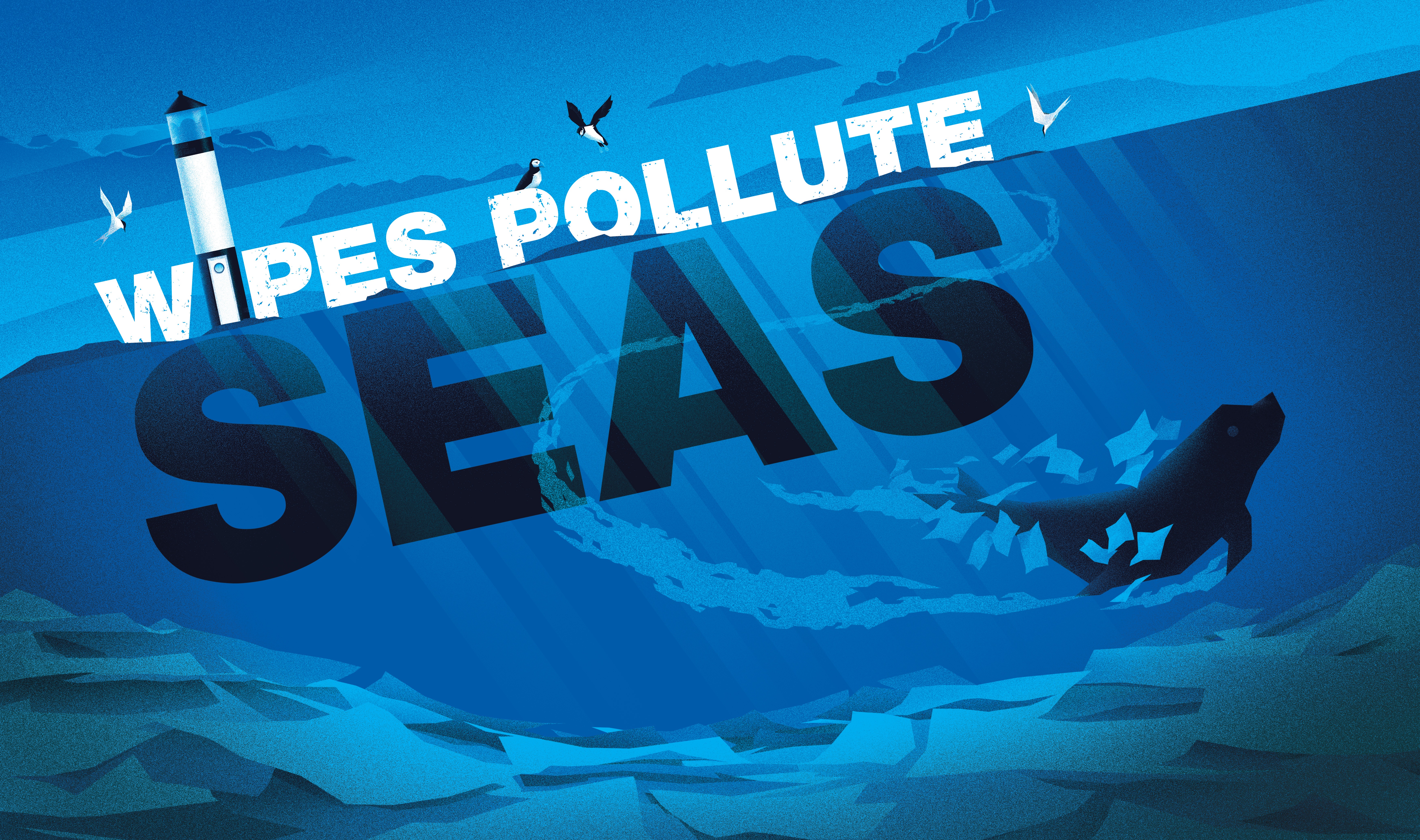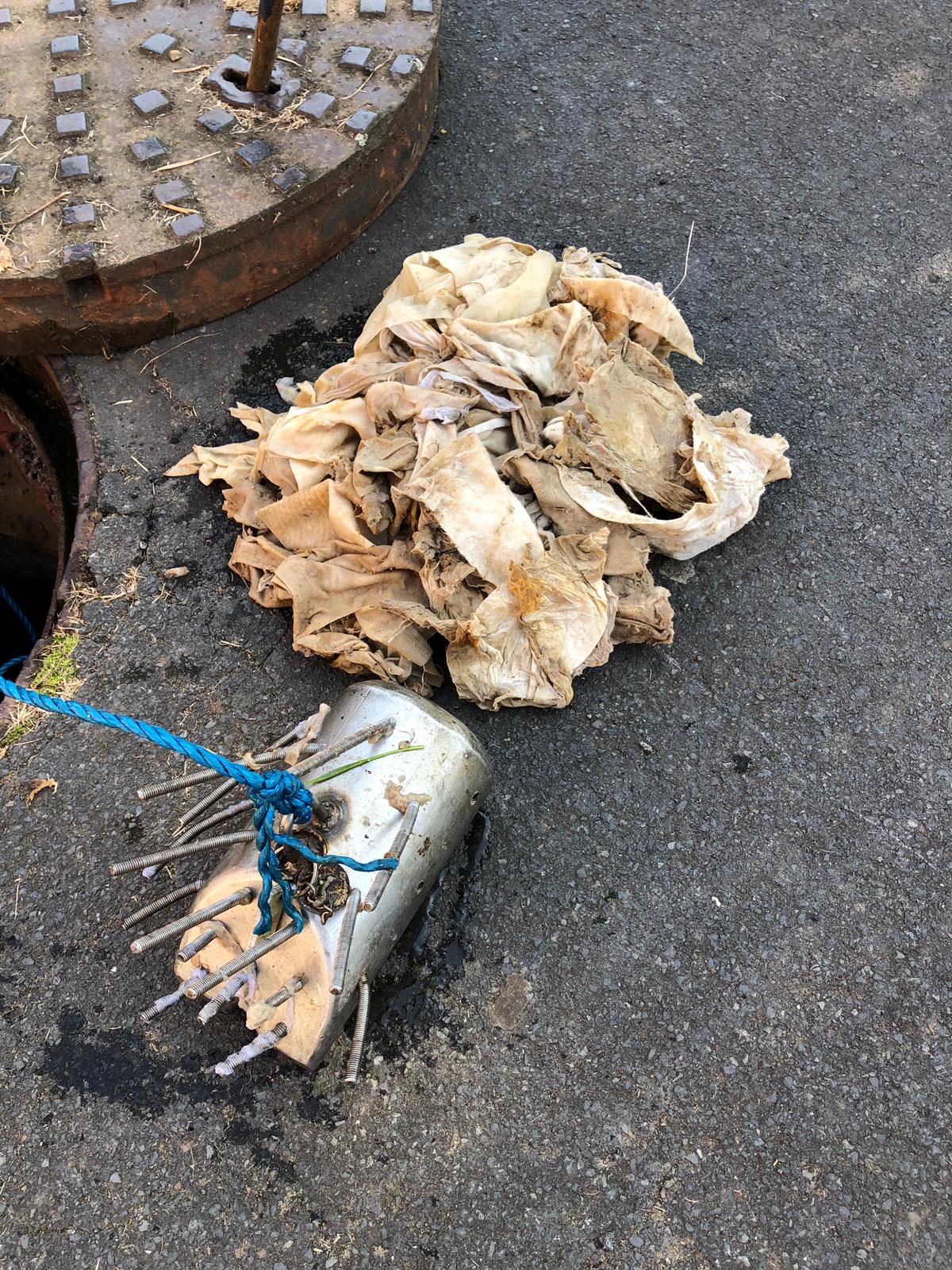Zoë Frogbrook, Head of Environment and Sustainability at Northumbrian Water Group, explains how their successful ‘Bin the Wipe’ campaign has helped reduce blockages in wastewater systems.
We hear it all the time: a small change makes a big difference, but in organisations that have a responsibility for the environment, small and significant changes really do matter. The environment is at the heart of everything Northumbrian Water does as a business, so its role in protecting the environment is not new: it forms part of the company’s purpose. So, when we asked the public to “Bin The Wipe” in a flagship campaign launched in 2020, we were asking for a small gesture, but one that we knew would have a positive impact on our water infrastructure.
Northumbrian Water’s wider Environment Strategy, published in September 2023, builds on some of the great work we have already achieved, and sets out the company’s direction for the future. This is primarily to achieve our environment ambition, which reads ‘Together, we are restoring and regenerating our natural environment, creating a better place through our actions’.
The Environment Strategy is made up of five environmental priorities that work together to contribute to this central ambition:
- Water management for the environment and people;
- Healthy catchments, rivers and coastal waters;
- Effective climate action;
- Valuing resources and eliminating waste; and
- Thriving nature and communities.
Our Bin The Wipe campaign is just one of the initiatives that help us towards our goal of achieving healthy catchments, rivers and coastal waters.
The primary purpose of Bin The Wipe is to stop ‘unflushables’ – namely wipes – being incorrectly disposed of down the toilet and ending up in the sewer network, where they can cause significant blockages. Our research found that over 60% of all sewer blockages are caused by wipes being disposed of in this way. These blockages lead to sewer flooding, which can have devastating impacts on customers’ homes and the environment, as the system becomes backed up and causes waste to flood into unwelcome areas.
When the campaign began in 2020, an ambitious target was set: to reduce sewer blockages and flooding by 40% across our catchment area. The campaign is embedded in behavioural science and — through an integrated marketing communication campaign — it directly tackles customer behaviours around flushing wipes. We know wipes have a universal appeal: they are, like so many consumables, convenient and relatively inexpensive. This means they often don’t have a typical target audience, as people from all walks of life use wipes for various purposes, including cleaning, make-up removal and hygiene reasons. It was therefore quickly established that as a product, they are too useful, and we cannot expect customers to completely stop using them. Instead, our campaign focuses on both the use of reusables to avoid the wipes ending up in landfill, and changing customer behaviour by encouraging them to use a bin for their wipes, instead of flushing them down the toilet.

A social media graphic used to spread the word about how wipes can harm wildlife and the marine environment. © Northumbrian Water
To make a real impact during this campaign, we have focused our messaging on different groups of people, to recognise and respond to the diversity of our audience. Our focused groups included:
- Young people, who were more likely to use wipes for make-up removal. Via social media, face-to-face engagement and a wider advertising campaign, they were taught about the importance of using reusable products, and the positive impact they have on the environment.
- Parents, especially those with young family members, who were more likely to use wipes in the bathroom and put them down the toilet. This information, and the fact that less than half of customers owned a bathroom bin, taught us that we needed to push the importance of having one.
- Consumers focused on hygiene and cleaning. Cleaning wipes are another kind of frequently-used wipe. For these customers, we again focused on the importance of reusable alternatives to disposable, single-use wipes.
In addition to this, all our customers in the North East are targeted with advertisements, including digital ads, TV, radio and podcasts, as we recognise that this is a nationwide issue.
At the start of the campaign, the imagery for Bin The Wipe had Northumbrian Water’s company name and logos deliberately removed in order to make the message stand out. Social media activity supported this with engaging content to really draw people in, using carefully chosen images of real-life blockages, alongside photos of collections of wipes and other unflushables that make it into the wastewater system, to show the devastating consequences wrongful flushing can have on both customers’ homes and the environment.
In 2022, we created a new ‘Wipes Pollute Seas’ artwork, which showed the direct impact that wipes can have on the environment. We distributed posters and beer mats with this artwork around our coastal hotspots, to bring the journey of wipes to life for people. The Wipes Pollute Seas artwork was so impactful, that we have created a new TV advertisement for 2023, to demonstrate the damage they are causing to the sea and animals. This will be shown on social media, TV and cinema across the North East.
We also embarked on the Big Bin Giveaway in 2022, which involved door-to-door customer engagement, offering an opportunity to discuss the issues with wipes, and asking customers to take part and bin the wipe. As part of this, we offered these customers a free bathroom bin, so that they would always have the option to bin the wipes they use.
We targeted the top 50 postcode sectors for flooding caused by wipes, through direct marketing letters, face-to-face customer engagement, and mass marketing. To help us identify where the wipes are coming from, our Sewerage Maintenance Operatives have been using innovative tools, created to capture wipes within different sewer pipe sizes and depths: one of which is named the Porcupine! These tools are lowered into manholes, and re-visited each day to monitor the number of wipes that are found. The positioning of the wipes on the tools shows the direction the wipes are flowing.

A porcupine sewer retrieval tool next to a haul of wet wipes brought up from a blockage in the sewer. © Northumbrian Water
By following each pipe in this way, the team can narrow the wipes down to a street (and eventually the individual household/s) who are flushing wipes. With the team manually collecting this data, they can then initiate face-to-face conversations with our customers about Bin the Wipe, educating them about the damage wipes are causing. The data has shown us that when we target hotspot areas like this, we can positively change customer behaviour, reducing wipe numbers by up to 91%.
We also regularly engage with our wider stakeholders, including local MPs and Councillors who have actively worked to support us throughout the campaign via social media, visits, and events.
The success of the campaign is evident: we exceeded the ambitious target of reducing sewer blockages and flooding by 40%, instead reducing the number of blockages by 50%, internal flooding by 68%, and external flooding by 50%. Results show that this behaviour has been sustained for up to 3 years since the launch of the campaign.
Research shows that 96% of customers are now aware that wipes cause sewer blockages, 93% agree that flushing wipes can be damaging to the environment, and 88% agree that they could be harmful to wildlife. Also, compared to the four-year period before ‘Bin the Wipe’ was launched, we have seen an 88% increase in the average monthly audience and a 91% increase in average monthly engagements for our social media messaging.
The success of the campaign and the support it has generated from customers, regulators and stakeholders, including members of parliament, has led to it being adopted by the water and wastewater industry as a whole, and the industry body, WaterUK. This has resulted in a national ‘Bin the Wipe’ campaign, which was launched in 2023.
Other than the obvious benefits to our environment, the geography of the North East means we are responsible for some of the most beautiful rivers, coasts and wildlife habitats in the country. We know how important they are for our communities, and looking after them is a huge part of what motivates our people to do the essential jobs that they do each day. We also understand how devastating sewer flooding can be in your home, a problem that can often be avoided if wipes are disposed of correctly: in the bin.
We recognise that, as a water company alone, we cannot solve all of the issues that impact our rivers and coasts. This is why, alongside making our own improvements, we want to support partners and stakeholders in their activities: working together will confer positive impacts on water quality and the wider natural environment.

About Zoë Frogbrook
Dr Zoë Frogbrook is Head of Environment and Sustainability for the Northumbrian Water Group. Zoë has worked within the water industry for over ten years, and has experience across a variety of areas including academic research in soils and agriculture, and environmental regulation.





